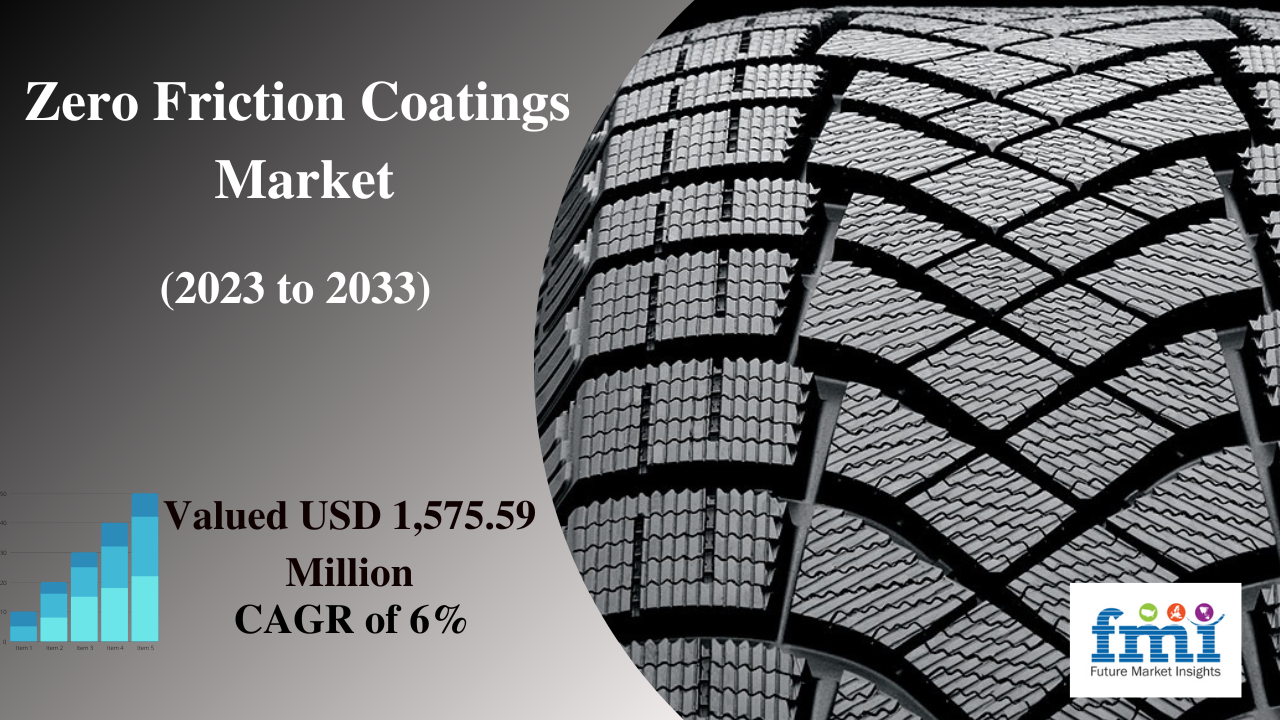The global zero friction coatings industry size is anticipated to hold a market value of US$ 879 Million in 2023 and US$ 1,575.59 Million by 2033. The projected growth rate is nearly 6% during the forecast period from 2023 to 2033. Growth can be attributed to the fact that these coatings reduce friction and wear resulting in low fuel consumption and less heat generation. According to the European Automobile Manufacturers’ Association, 79.1 million motor vehicles were produced across the globe in 2021 which was up by 1.3% as compared to 2020. Zero friction coatings can extend the time between component maintenance and replacement, especially for machine parts that are expensive to manufacture.
Several applications in the automobile industry use wear-resistant plastic seals that require zero tolerance for failure and lifetime service confidence. Increasing demand for the product from the automotive industry across the globe for various applications including fuel pumps, automatic transmissions, oil pumps, braking systems, and others is expected to drive its demand over the forecast period. Low friction coatings can be used in extreme environments comprising high pressure, temperatures, and vacuums. These coatings can provide improved service life and performance thereby eliminating the need for wet lubricants in environments that require chemicals, heat, or clean room conditions. The products containing molybdenum disulfide (MoS2) are suitable for reinforced plastics while those free from MoS2 are suitable for non-reinforced plastics.
Get an overview of market drivers and challenges affecting this industry! https://www.futuremarketinsights.com/reports/sample/rep-gb-15934
Zero friction coatings are paint-like products containing submicron-sized particles of solid lubricants dispersed through resin blends and solvents. The product can be applied using conventional painting techniques such as dipping, spraying, or brushing. The thickness of the film has a considerable influence on the anti-corrosion properties, coefficient of friction, and service life of the product. Its thickness should be greater than the surface roughness of the mating surfaces.
Key Takeaways from the Market Study
- In 2022, molybdenum disulfide emerged as the dominant type segment by contributing around 50% of the revenue share.
- The automobile & transportation was the dominating end-use segment accounting for a revenue share of more than 35% in 2022 due to the rapid growth of the automotive industry across the globe.
- The energy end-use segment is anticipated to grow at a CAGR of 5.7% in terms of revenue by 2033.
- In Asia Pacific, the market is projected to witness the highest CAGR of 5.8% over the predicted years.
“Properties of zero friction coatings such as vacuum & radiation resistance, dry and clean lubrication that is not affected by dust, non-flammability, and no oxidation are predicted to foster the product demand over the forecast period,” says an analyst at Future Market Insights.
Key Market Players
Major players are channelling efforts toward expanding their production capacities to strengthen their market share and cater to the growing demand. Market expansion is anticipated to be aided by the growing number of partnerships and collaborations among key players that are looking to increase their presence in the market. Key players in the zero friction coatings market are Endura Coatings; DuPont; VITRACOAT; Poeton; Bechem; ASV Multichemie Private Limited; GMM Coatings Private Limited; and IKV Tribology Ltd. Some of the recent key developments among key players are:
- In June 2020, Poeton Industries launched the latest in a long line of ground-breaking surface treatments. The Gloucester based company has launched Apticote 480A, a new composite coating that combines the properties of nickel and fluoropolymer materials into one problem-solving solution. The new advanced coating builds on the strong Poeton history of developing innovative solutions. The treatment has been created in the Poeton Research & Development Laboratory led by Dr John Archer and builds on the success of existing nickel-polymer treatments.
Have a discussion with our Analyst:https://www.futuremarketinsights.com/ask-question/rep-gb-15934
More Valuable Insights
Future Market Insights, in its new offering, presents an unbiased analysis of the global zero friction coatings market, presenting historical analysis from 2018 to 2022 and forecast statistics for the period of 2023-2033.
The study reveals essential insights on the basis of Type (Polytetrafluoroethylene, Molybdenum Disulfide), By Application (Aerospace, Energy), & Region.
Key Market Segments Covered in the Global Zero Friction Coatings Market
By Type:
- Polytetrafluoroethylene
- Molybdenum Disulfide
- Others
By Formulation:
- Solvent-based Coatings
- Water-based Coatings
- Powder Coatings
By End Use:
- Automobile & Transportation
- Aerospace
- General Engineering
- Food & Healthcare
- Energy
- Others
Region:
- North America
- Latin America
- Europe
- Asia Pacific
- Middle East & Africa
About Future Market Insights (FMI)
Future Market Insights, Inc. (ESOMAR certified, recipient of the Stevie Award, and a member of the Greater New York Chamber of Commerce) offers profound insights into the driving factors that are boosting demand in the market. FMI stands as the leading global provider of market intelligence, advisory services, consulting, and events for the Packaging, Food and Beverage, Consumer Technology, Healthcare, Industrial, and Chemicals markets. With a vast team of over 5,000 analysts worldwide, FMI provides global, regional, and local expertise on diverse domains and industry trends across more than 110 countries.
Contact Us:
Nandini Singh Sawlani
Future Market Insights Inc.
Christiana Corporate, 200 Continental Drive,
Suite 401, Newark, Delaware – 19713, USA
T: +1-845-579-5705
For Sales Enquiries: sales@futuremarketinsights.com
Website: https://www.futuremarketinsights.com
LinkedIn| Twitter| Blogs | YouTube
